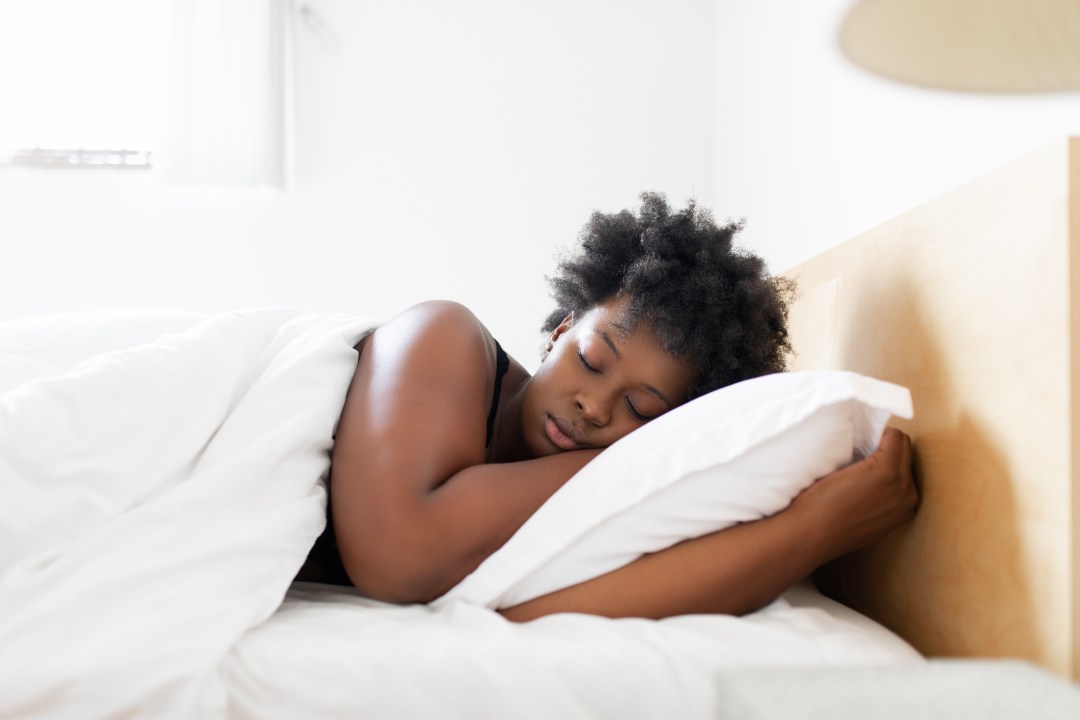Get your sleep back on track
As well as changing our lives, the pandemic has disrupted our sleeping patterns. But why? What’s causing us to wake during the night or early in the morning, and how can we get our sleep back on track?

Picture this: at the first hint of dawn, your eyes snap open. You blearily reach for your phone to check the time, see it is unholy o’clock and turn over to try and find your way back to that lovely dream you were having. Suddenly, your mind is flooded with your to-do list; that weird meeting you had with your boss yesterday; something you must add to your online shop…You lie there, thoughts chasing each other around your head until your alarm goes off at 7am, when you stagger, exhausted, from your bed. Sound familiar? It is a scenario that plays out in bedrooms across the country in the wee hours of every morning of the year, but it is particularly challenging right now. Waking with the dawn chorus at 4am is a very different experience during the lighter months than it is in winter, when at least you can make the most of the dark mornings and snuggle back under the duvet when insomnia strikes.
How our body clocks are affected
Of course, after all the trials of the past 18 months, it’s not surprising that some of us are paying the price. Emotional wellbeing expert and psychotherapist Gosia Bowling explains that our body clocks have been thrown out of sync by changes to our routines and habits, such as working from home, homeschooling and being furloughed. ‘Unable to rely on our usual time anchors, such as daily commutes and normal routines, our bodies struggle to regulate the time and switch off at night,’ she says. ‘Our sleep cues become confused.’ This is known as sleep-maintenance insomnia, which can lead to difficulty falling asleep, waking up at night and early awakenings.
Adjusting to a post-lockdown lifestyle
But you don’t have to accept night waking or dawn rising as your new normal: it is possible to remedy sleep issues and gain more shut-eye. Clinical psychologist Lloyd Humphreys says routine is key. ‘Experiencing sleep troubles is not uncommon because we’re adjusting to a post-lockdown lifestyle. Combine socialising in the evenings with going back into the workplace and light summer mornings, which naturally tend to shift sleeping patterns, and many of us will find that we’re waking early, using lots of energy and getting little rest,’ he says. In a sleep rut, the quickest fix is to identify and shift negative patterns. Humphreys says cognitive behavioural therapy techniques can help. ‘Often, the hardest thing to put your finger on is the reason you’re experiencing problems,’ he explains.
Write your thoughts down
Try keeping a diary by your bed so you can write down anything that comes to mind when you wake at night. ‘This acts as a deposit for all the thoughts taking up your brain space and helps set them aside until the morning,’ says Humphreys. ‘If necessary, challenge the accuracy of each negative thought – ask yourself if there’s any hard evidence for or against the validity of the thought.’
Get grounded
Another technique to break thought cycles when you wake is to get out of bed and work through a grounding exercise to reset you before getting back into bed to go back to sleep. ‘Splash cold water on your face and focus on how it feels, open a window and take several breaths of fresh air, or put on some music and draw a line on a piece of paper, using your pen to follow the sound of the music,’ suggests Humphreys. ‘These exercises bring you back to the now and counteract your natural desire, whether conscious or subconscious, to get lost in thought.’
Re-assess your evening routine
Also think about your typical evening routine before you settle down to sleep at night. A recent survey by Vita Health Group found that many of us scroll through social media in bed before sleep time. However, this can be an emotional avoidance tactic that has a detrimental effect, according to head of wellbeing at Vita Health Tom Bivins. ‘Night-time is often the first time we’re left alone with our thoughts without distraction and, while this might come as a welcome relief to some, we may attempt to push negative or uncomfortable thoughts out of mind with social media,’ he says. ‘The danger of scrambling for a distraction is that emotional avoidance is only a temporary fix. Your body will be using considerable effort to keep those feelings quashed, but it’s also likely that the feelings you are avoiding will grow stronger, more intense and even uncontrollable over time.’ Instead of scrolling, try a few moments of self-reflection. ‘Preventative management techniques help break the cycle, leaving you feeling more comfortable with your emotions and better able to achieve a restful sleep,’ says Bivins.
Make time for self-reflection
‘Taking a little time every day to engage in self-reflection can be beneficial, helping you process your thoughts and feelings and put things into perspective.’ It’s easy to dread bedtime if you’re suffering from sleep problems. Avoid that by creating a sanctuary-like space with soft furnishings and accessories that help soothe the bedtime blues. A weighted blanket, relaxing pillow spray and stack of reading material can go a long way. After all, if you’re spending more time awake in your room than you would like, you might as well make it a calming, comforting place. And, above all, remember that your usual sleeping pattern is likely to return once life gets back to normal.
Case Study #1
Janice Tracey, a nutritional therapist, found that breathing exercises helped her cope with sleeplessness.
‘Early waking devastated me when I was working and raising a family. I was exhausted! It helped to do breathing exercises the moment I woke: Two short, fast breaths in and a longer breath out, repeatedly. I’d get back to sleep about 70 per cent of the time but, even if I didn’t, the breathing helped me relax and feel rested, rather than anxious about the fact that I was not sleeping.’
Case Study #2
Pearl Howie, an author and fitness instructor, believes early morning waking is a significant opportunity to confront her worries.
‘The Dalai Lama wrote about waking at dawn and many traditions recognise that the time before sunrise is signifi cant from a spiritual perspective,’ she says. ‘I think of it as precious. It’s why many retreats include early bedtimes and sunrise walks. When I wake up, I work on letting go of my fear, calming my mind and meditating to fi nd peace. Now, I’m prepared for the 4am wake-up, and greet it like a warrior.’
Three tips to tackle wakefulness
Psychotherapist Gosia Bowling recommends this trio of tickets to dreamland
Next steps
Invest in a good night’s sleep with one of these tried-and-tested sleep aids
The Sleep School, founded by leading sleep expert Guy Meadows, has an app that offers a range of support, from daily tips and advice to 30-day courses and video sleep clinics. Sleep School App, £29.99.
Designed in collaboration with sleep experts, Morphée is a non-digital, screen-free aid. It features more than 200 relaxing audios to help you drift off, including nature sounds, guided meditations and breathing exercises. The purring Burmese cat in a Parisian apartment is especially soothing! Morphée, £79.99.
Body-led psychotherapist and breath expert Oliver James covers how to breathe your way to better sleep, including powerful exercises to stimulate the yawn complex and release sleep-inducing hormones. 21 Breaths: Breathing Techniques To Change Your Life (Unicorn Publishing, £12.50).
The beautiful sleep journal ‘End of day’ is a space to record affirmations, practise gratitude and refl ect to help you unwind as sleep time comes around. When she used this journal, our tester had her best night’s kip since the start of the pandemic. ‘End of day’ wellness journal, £19.99.
Words: Heidi Scrimgeour
Photograph: Getty Images








